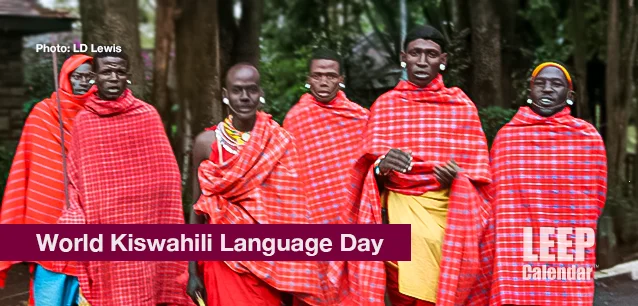 AD
AD
Today is: November 23
Scroll to explore events active on this date.
LEEP INK FEATURES

August is Appropos
A toddler playing in the fountain at a park in Santa Fe, New Mexico—Photo LD Lewis. In August, we live through the Dog Days of Summer. It's hot and often humid, and those ...

September is Sassy
Can you hear that sigh of relief from parents worldwide? Yes! September marks the return of students to school, a global phenomenon. Preparations for the ACT and SATs begin earnestly for ...

OOH LA LA, October
October is the busiest month for events, with 5% more happening than in May, the second most eventful month. Sailing enthusiasts will be glued to the finals of this year's Am...
About World Kiswahili Language Day
Education , Africa
Ends: Jul 07, 2025
DESCRIPTION:
In the 1950s, the United Nations established the Kiswahili language unit of United Nations Radio. Today, Kiswahili is the only African language within the Directorate of Global Communications at the United Nations. The UN General Assembly, through its resolution 71/328 of 11 September 2017, advocated for a day dedicated to each of its official languages to promote awareness of their history, culture, and use. The resolution also encouraged the expansion of this initiative to other non-official languages spoken globally.
In response, the 41st session of the General Conference of UNESCO adopted resolution 41 C/61, which recognized the role of the Kiswahili language in promoting cultural diversity, fostering dialogue among civilizations, and advancing multilingualism as a core value of the UN. As such, UNESCO proclaimed 7 July each year as World Kiswahili Language Day, making Kiswahili the first African language to be recognized in such a manner by the UN.
Kiswahili, a Bantu language, is one of the most widely spoken African languages, with over 200 million speakers and more than a dozen main dialects. It is a common form of communication in many parts of sub-Saharan Africa and the Middle East, bridging both past and present.
VIDEOS
Currently, this event does not have supporting videos.
SUPPORTING DOCUMENTS
Currently, this event does not have supporting documents.
ADDITIONAL IMAGES
Currently, this event does not have supporting images.
Where would you like to go now?
 AD
AD


/footer-logo.svg)
